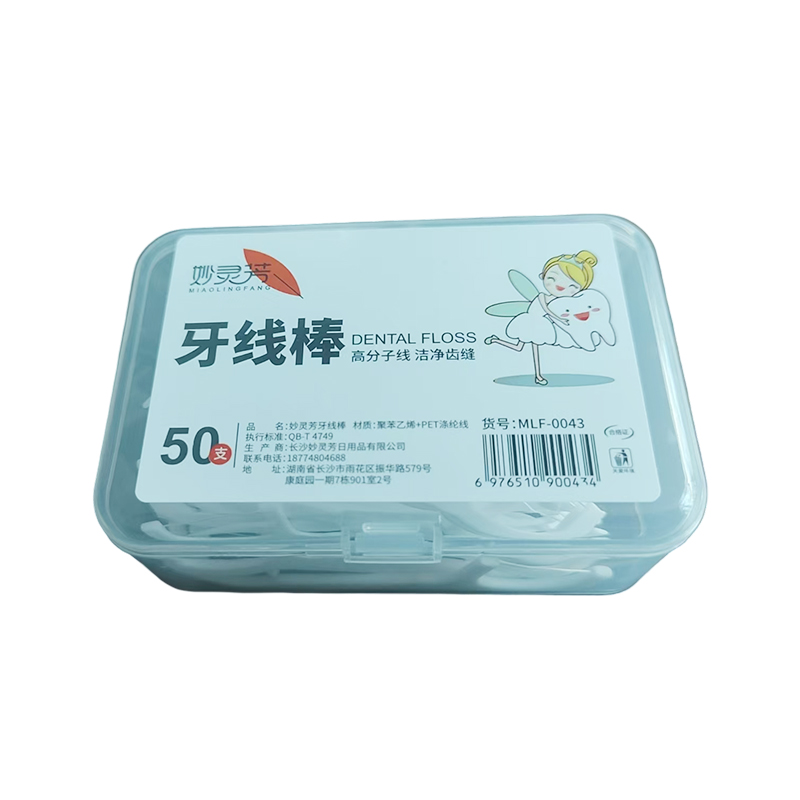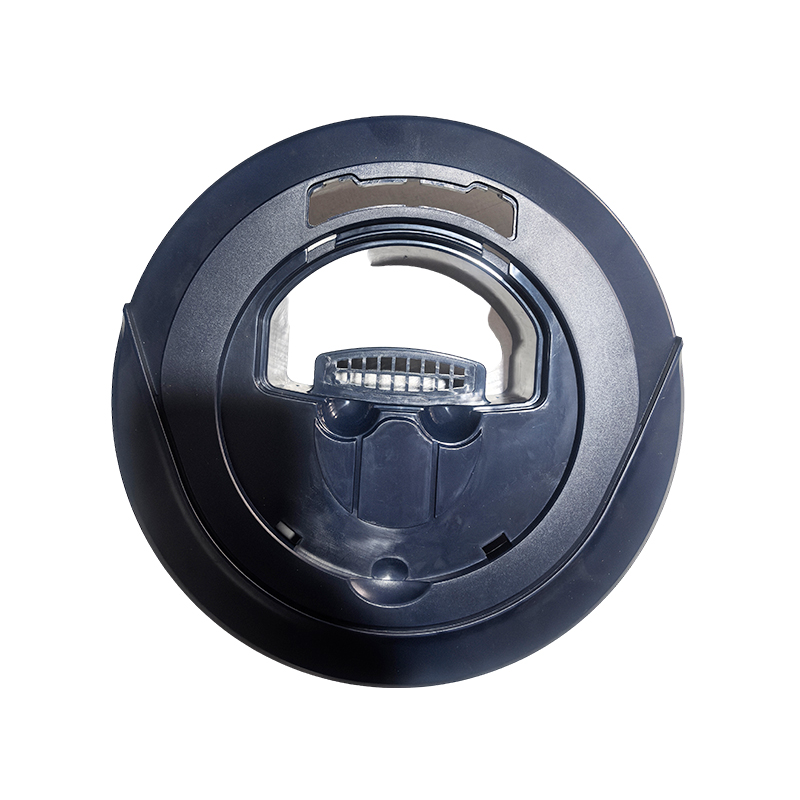What are the advantages of plastic dental floss sticks in terms of durability and fracture resistance?
Release Time : 2025-05-21
Plastic dental floss sticks occupy an important position in modern oral care products. Their superior durability and fracture resistance are one of the important reasons why consumers widely favor them. Compared with dental floss sticks made of traditional dental floss or other materials, plastic materials not only improve the stability and safety of use, but also show unique advantages in terms of portability and ease of operation.
First of all, plastic materials themselves have good toughness and ductility, which enables dental floss sticks to withstand large bending and tension during daily use without breaking easily. This feature is crucial for dental floss sticks that need to be bent frequently to enter the gaps between teeth. Many traditional dental floss sticks are prone to breakage due to uneven force or improper angles during use, affecting cleaning efficiency and even causing accidental injuries. Plastic materials can flexibly adapt to different tooth arrangements while maintaining structural integrity, ensuring that every cleaning is carried out smoothly.
Secondly, plastic materials have strong fatigue resistance. After being bent and stretched many times, it can still maintain its original shape and strength, and will not crack or become brittle like some metal or wood materials. This feature is particularly suitable for users who often use dental floss sticks, who can use the same dental floss stick repeatedly for a long time without worrying about structural failure. In addition, plastic materials also have a certain degree of resilience, and can quickly return to their original shape after being deformed by external forces. This "memory" further enhances its durability.
Furthermore, plastic dental floss sticks are usually manufactured using injection molding technology, which can ensure the consistency and uniformity of the overall structure of the product. Compared with manual assembly or other processing methods, injection molding avoids the possibility of defects such as bubbles and impurities in the material, thereby greatly improving the mechanical strength and service life of the product. At the same time, by adjusting the formula and processing parameters, manufacturers can produce plastic dental floss sticks suitable for different needs, such as softer products to adapt to sensitive gums, or harder designs to deal with stubborn dental plaque.
It is worth noting that the safety and comfort of plastic dental floss sticks during use are also closely related to their durability. Since plastic materials are not easy to break, no sharp fractures or fragments will be produced during use, effectively reducing the risk of injury to the gums and oral soft tissues. In addition, the plastic surface is relatively smooth and has a low friction coefficient, which will not cause scratches or discomfort when sliding between teeth, making the entire cleaning process more gentle and efficient.
From an environmental perspective, although disposable plastic products were once questioned, with the development of degradable plastics and environmentally friendly production processes, more and more dental floss sticks are made of recyclable or biodegradable materials. These new plastics not only retain the excellent physical properties of traditional plastics, but also decompose naturally after being discarded, reducing the impact on the environment. This design concept that takes into account durability and sustainability makes the plastic dental floss stick meet the functional requirements while also meeting the expectations of modern society for green consumption.
In order to extend the service life of the plastic dental floss stick and maintain the best use effect, the correct use and storage methods should not be ignored. For example, avoiding excessive pulling or repeated pressure on the same position can help reduce damage caused by local stress concentration; after use, the dental floss stick should be stored in a dry and ventilated place to prevent bacteria from growing in a humid environment or causing material aging. Following these simple maintenance principles can maximize the durability of plastic dental floss sticks.
With the continuous advancement of material science and manufacturing processes, plastic dental floss sticks will demonstrate their excellent performance in more aspects in the future. For example, by introducing antibacterial ingredients or smart sensing materials to enhance its functionality in oral health protection; or by combining personalized design to provide users with a more recognizable and fun product experience. Whether from the perspective of practicality or innovation, plastic dental floss sticks will continue to play an indispensable role in the field of oral care.
In summary, plastic dental floss sticks have significant advantages in durability and fracture resistance due to their excellent toughness, fatigue resistance and structural consistency. Whether in daily home use or in multi-scenario applications such as travel and office, it can provide stable and reliable support, becoming an ideal choice for modern people to maintain oral health.
First of all, plastic materials themselves have good toughness and ductility, which enables dental floss sticks to withstand large bending and tension during daily use without breaking easily. This feature is crucial for dental floss sticks that need to be bent frequently to enter the gaps between teeth. Many traditional dental floss sticks are prone to breakage due to uneven force or improper angles during use, affecting cleaning efficiency and even causing accidental injuries. Plastic materials can flexibly adapt to different tooth arrangements while maintaining structural integrity, ensuring that every cleaning is carried out smoothly.
Secondly, plastic materials have strong fatigue resistance. After being bent and stretched many times, it can still maintain its original shape and strength, and will not crack or become brittle like some metal or wood materials. This feature is particularly suitable for users who often use dental floss sticks, who can use the same dental floss stick repeatedly for a long time without worrying about structural failure. In addition, plastic materials also have a certain degree of resilience, and can quickly return to their original shape after being deformed by external forces. This "memory" further enhances its durability.
Furthermore, plastic dental floss sticks are usually manufactured using injection molding technology, which can ensure the consistency and uniformity of the overall structure of the product. Compared with manual assembly or other processing methods, injection molding avoids the possibility of defects such as bubbles and impurities in the material, thereby greatly improving the mechanical strength and service life of the product. At the same time, by adjusting the formula and processing parameters, manufacturers can produce plastic dental floss sticks suitable for different needs, such as softer products to adapt to sensitive gums, or harder designs to deal with stubborn dental plaque.
It is worth noting that the safety and comfort of plastic dental floss sticks during use are also closely related to their durability. Since plastic materials are not easy to break, no sharp fractures or fragments will be produced during use, effectively reducing the risk of injury to the gums and oral soft tissues. In addition, the plastic surface is relatively smooth and has a low friction coefficient, which will not cause scratches or discomfort when sliding between teeth, making the entire cleaning process more gentle and efficient.
From an environmental perspective, although disposable plastic products were once questioned, with the development of degradable plastics and environmentally friendly production processes, more and more dental floss sticks are made of recyclable or biodegradable materials. These new plastics not only retain the excellent physical properties of traditional plastics, but also decompose naturally after being discarded, reducing the impact on the environment. This design concept that takes into account durability and sustainability makes the plastic dental floss stick meet the functional requirements while also meeting the expectations of modern society for green consumption.
In order to extend the service life of the plastic dental floss stick and maintain the best use effect, the correct use and storage methods should not be ignored. For example, avoiding excessive pulling or repeated pressure on the same position can help reduce damage caused by local stress concentration; after use, the dental floss stick should be stored in a dry and ventilated place to prevent bacteria from growing in a humid environment or causing material aging. Following these simple maintenance principles can maximize the durability of plastic dental floss sticks.
With the continuous advancement of material science and manufacturing processes, plastic dental floss sticks will demonstrate their excellent performance in more aspects in the future. For example, by introducing antibacterial ingredients or smart sensing materials to enhance its functionality in oral health protection; or by combining personalized design to provide users with a more recognizable and fun product experience. Whether from the perspective of practicality or innovation, plastic dental floss sticks will continue to play an indispensable role in the field of oral care.
In summary, plastic dental floss sticks have significant advantages in durability and fracture resistance due to their excellent toughness, fatigue resistance and structural consistency. Whether in daily home use or in multi-scenario applications such as travel and office, it can provide stable and reliable support, becoming an ideal choice for modern people to maintain oral health.







